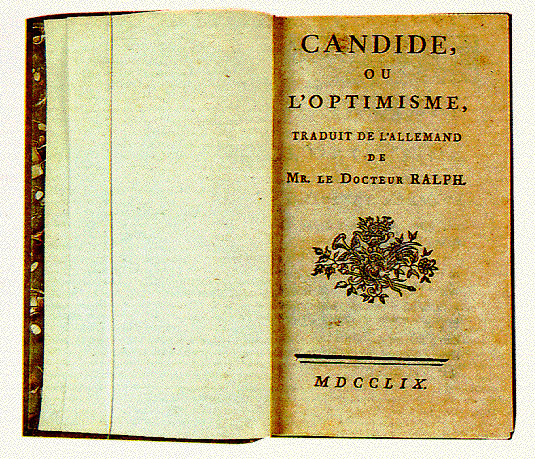In this second installment on Voltaire, I will discuss his core beliefs, as well as his most famous work (which is coincidentally one of my favorite philosophical pieces, but more on that in post #3).
Voltaire’s philosophy mainly deals
with personal freedom, the role of government, and the role of religion in
people’s lives. He was widely known for his criticisms of the government and
church, which also led to his trouble with both and multiple imprisonments. He
spoke out with great passion and unbridled speech against the controlling tendencies
and unfair acts of the government. In much of the same way, he was outspoken
against the use of religion to control people as well. It is not to be assumed
that Voltaire was against religion. To the contrary, Voltaire was by many
accounts a devout Christian. However, he was against hierarchy of the church
and the rule that it imposed over people, as well as its involvement in
government. Another interesting note was that Voltaire was an early advocate
for civil rights, maintaining that all people deserved to be treated fairly and
equally. He believed that personal liberty was a key ingredient to a happy life
and a functional society.
Voltaire perceived the French
bourgeoisie to be too small and ineffective, the aristocracy to be parasitic
and corrupt, the commoners as ignorant and superstitious, and the church as a
static force only useful as a counterbalance since its "religious
tax", or the tithe, helped to cement a powerbase against the monarchy. He
distrusted democracy, which he saw as propagating the idiocy of the masses. To
Voltaire only an enlightened monarch, advised by philosophers like himself,
could bring about change as it was in the king's rational interest to improve
the power and wealth of France in the world. Voltaire is quoted as saying that
he "would rather obey one lion, than 200 rats of (his own) species".
Voltaire essentially believed monarchy to be the key to progress and change.
He is best known in this day and
age for his novel, Candide ou l'Optimisme, first published in 1759, which
satirizes the philosophy of Gottfried Leibniz. Voltaire criticizes Leibniz’s optimistic
views through the characters maintaining that this is “the best of all possible
worlds” even through many consecutive horrible events that seemed to have no
practical reason for happening. At the same time, Voltaire seems to emphasize
the importance of remaining practical and rooted in the real world. By the end
of the book, the main character, Candide, has renounced idly philosophizing and
committed to working with his hands. This does not seem to be a denunciation of
philosophy in general, but a warning against unrestrained optimism and failing
to care for your worldly well-being and responsibilities. Voltaire is also
known for many memorable aphorisms, like Si Dieu n'existait pas, il faudrait
l'inventer ("If God did not exist, it would be necessary to invent
him").
Today, Voltaire is remembered and
honored in France as a courageous polemicist, who indefatigably fought for
civil rights, the right to a fair trial and freedom of religion, and who denounced
the hypocrisies and injustices of the ancient régime. But some of his critics,
like Thomas Carlyle, argue that while he was unsurpassed in literary form, not
even the most elaborate of his works was of much value for matter, and that he
has never uttered any significant idea of his own.

No comments:
Post a Comment
Note: Only a member of this blog may post a comment.